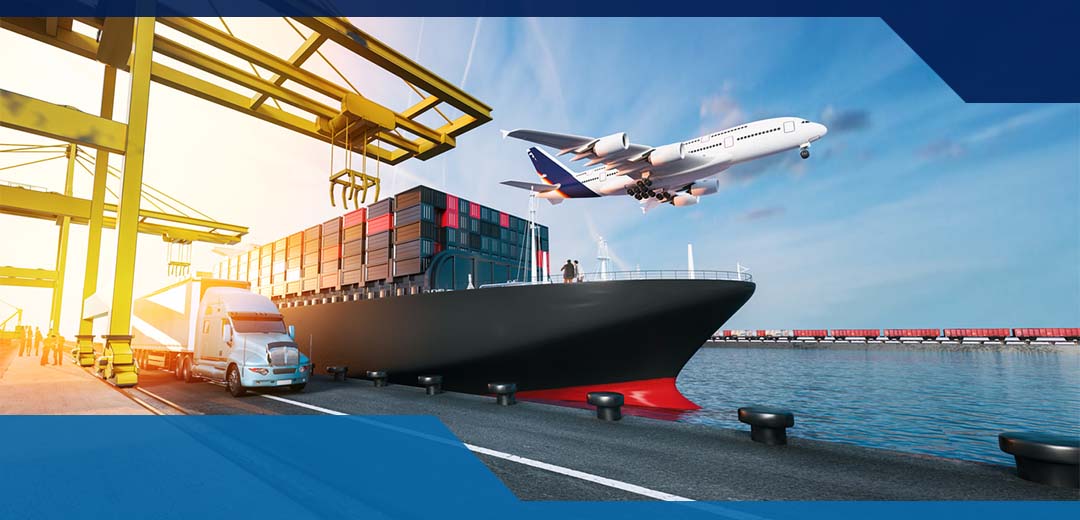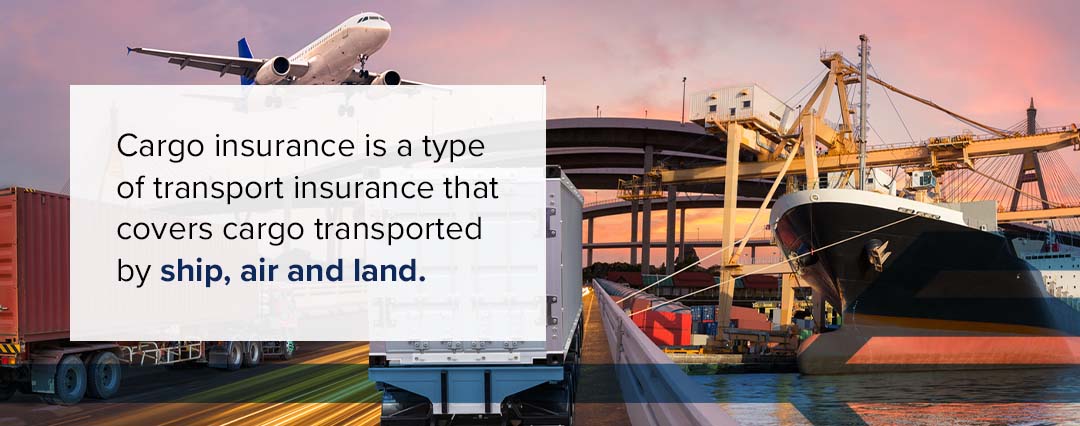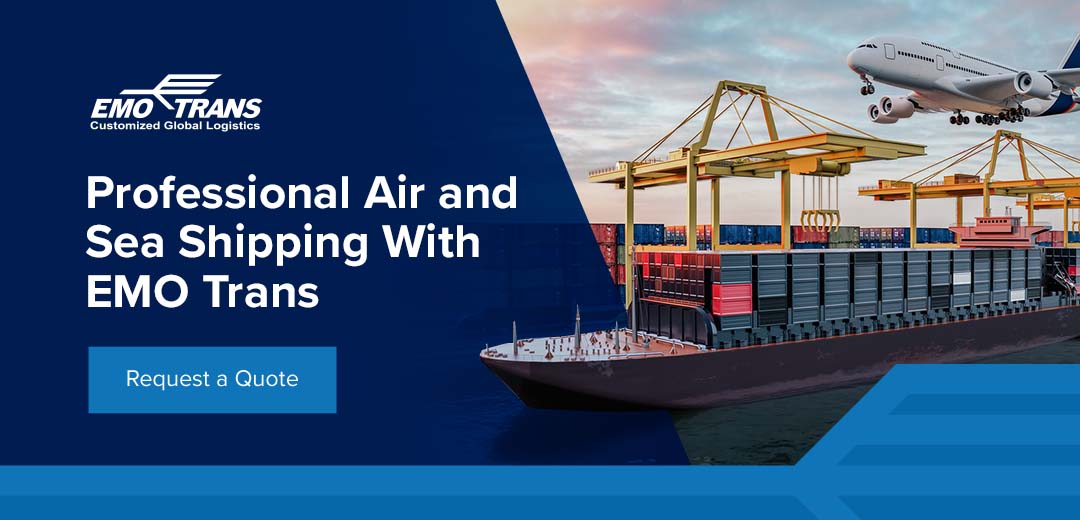
The shipping of products and cargo across the world comes with certain risks. Cargo can get damaged, stolen or lost during transport. Weather conditions and backlogs can cause shipping delays causing you to pay additional fees for storage, warehousing or release. Each of these factors affects your business and your bottom line.
This is why cargo insurance is essential. It is a risk management tool that helps protect you against financial losses due to lost or damaged cargo. There are different types of cargo insurance based on your method of transportation and what you need coverage for. This guide looks at what cargo insurance is, who is responsible and the different types of insurance.
What Is Cargo Insurance?
Cargo insurance is a preventative measure that can lessen the impact of any financial losses resulting from cargo damage and theft that may occur during air, sea or land transportation. Some events covered by cargo insurance include natural disasters, cargo abandonment, acts or war, piracy, vehicle accidents, and customs delays or rejection.
Cargo insurance is an extra elective cost when shipping. While it is an additional cost, it is worth it as it will cover the total value of your shipment and any associated costs, such as lost income or extra storage and customs fees.
How Does Cargo Insurance Work?
As with most insurance, cargo insurance is based on the clauses outlined in a policy. The clauses in the policy can cover everything from acts of God to war and piracy. Premiums are paid upfront and policyholders can claim for any damage or loss that occurs during transit.
The average cost of insurance is about 0.15% of the total value of goods you are shipping. This will vary based on insurance companies, their offerings, the transport method and the goods being shipped. Some companies may use a basic formula that takes the insured value and multiples it by the policy rate to get the premium per shipment. For example, if you have a load worth $50,000 and your insurance provider charges $0.50 per $100, your premium will be $250.
This will be the primary premium cost. Other factors will impact the cost of your insurance, including:
- General liability
- Transport method
- Type of cargo
- Policyholder loss history
The party delivering the cargo is usually responsible for cargo insurance. This can be the buyer or the seller, but it is typically the party with the highest financial investment in the cargo.

Types of Cargo Insurance
Cargo insurance is a type of transport insurance that covers cargo transported by ship, air and land. There are two main types of cargo insurance coverage — land and marine cargo insurance. Each type of insurance covers different modes of transport and the damages associated with each method.
Marine Cargo Insurance
As its name suggests, marine cargo insurance covers shipments by sea. Because of this, it is also known as ocean freight insurance. It can also cover air freight and land transport if it is part of the shipping journey. This type of insurance is typically used for international shipments as it covers more than one country and crosses borders. It typically covers damages associated with air and ocean shipping including piracy, container loss, damages due to bad weather, loading and loading damage and any other losses experienced while on a ship or plane.
Land Cargo Insurance
Land cargo insurance covers shipments transported overland in trucks and other utility vehicles. It is also known as motor or inland transport insurance. Motor cargo insurance is typically used for domestic shipments as its scope is only within a country’s geographical boundaries. If cargo is shipped between countries on land, you may need additional or multinational insurance to cover the different regions.
This insurance typically covers collision damage, theft and other damages associated with land transport. If you are storing your cargo in a truck overnight, it is essential to check if your insurance policy covers theft and other damages you may experience.
Cargo Insurance Policies
In addition to the types of cargo insurance, several kinds of insurance policies are available to shippers. These policies are all different based on your shipping needs. Here are a few of the most coverage policies:
- Single cover: This covers a single shipment and is generally used by businesses that ship infrequently or are just getting started with shipping.
- Open cover: Companies that regularly transport cargo. There are two types of open cover, permanent and renewable. Permanent open cover is valid for a certain period and allows unlimited shipments during this time. It is usually for one year. Renewable open cover can be renewed after each delivery. This is ideal for businesses that ship semi-frequently, once every two months rather than every week, for example.
- All risk cover: This covers nearly any damage caused by uncontrollable external factors. It does not cover loss from customs rejection, cargo abandonment, unpaid invoices, natural calamities or damage from negligence, war, riots and civil unrest.
- Free from particular average cover: It is also called a peril policy as it covers the losses from damages not included in all risk cover, such as acts of God, theft, sinking or derailment, weather and natural calamities, non-delivery, collision and more.
- General average cover: This is mainly for marine cargo insurance. If cargo is lost or damaged while trying to save the ship, every cargo owner must contribute to the cargo losses, even if it is not your cargo. This cover only covers part of the value of your shipment.
What Is Not Covered by Cargo Insurance?
There are a few things that cargo insurance doesn’t cover. This includes damage from:
- Faulty and flawed products
- Improper and inadequate packaging
Some cargo insurance may not cover specific items, including hazardous cargo, some electronic devices, delicate cargo, metal goods or highly valuable cargo. Policies can also be particular about the type of transport they cover. Some policies only cover land transport rather than sea or vice versa. Always read through your policy to ensure you are adequately covered.
Professional Air and Sea Shipping With EMO Trans
Whether transporting cargo domestically or internationally, you need to be aware of the risks. Choosing the right shipping partner can help you mitigate risks. EMO Trans has over 55 years of experience transporting cargo and freight worldwide. We have 85 EMO Trans offices in 21 countries and over 250 network offices in 120 countries covering six continents.
Our freight professionals will work closely with you to choose the proper shipping method and cargo insurance for your needs. Request a quote from us today!

